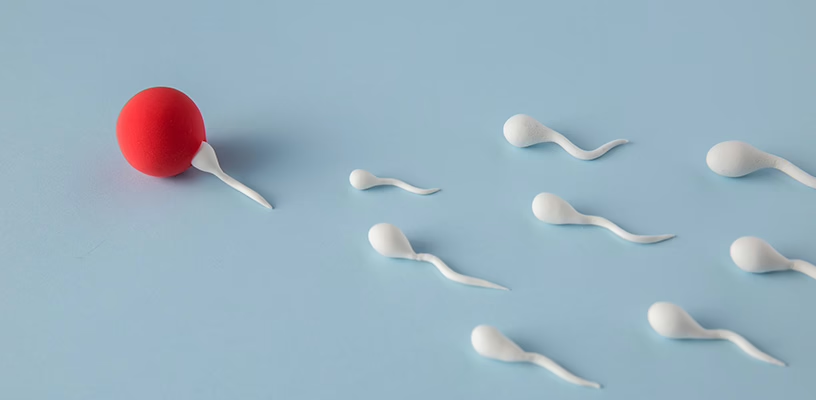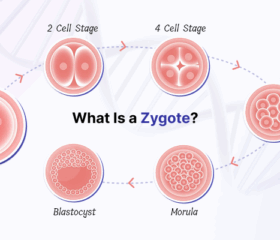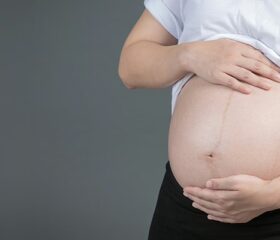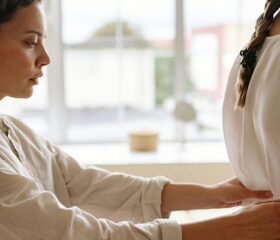Fertilization: What It Is, Where It Happens, and How It Feels
Fertilization is nature’s survival show. Hundreds of millions of sperm race toward your egg, but only dozens will reach it, and just one will be able to fertilize it.

Fertilization may seem simple on paper, but it’s actually a complex process that relies on precise timing and many factors both in and outside of your control.
Let’s explore the science behind fertilization, where it happens, and what factors influence this first step towards pregnancy.
What is fertilization?
Fertilization is the moment your partner’s sperm meets and fuses with your egg. This union creates a single cell called a zygote, which may later develop into your baby. 1
Again, fertilization is the first step toward pregnancy, but there are still many other complex processes that need to happen afterwards for your baby to develop.
Fertilization vs. conception: what’s the difference?
Many use the terms fertilization and conception interchangeably. In general, fertilization refers to the exact moment that the egg and sperm merge, while conception refers more broadly to the start of your pregnancy, which encompasses the moment of fertilization and the process after that, where the zygote implants in your uterus (womb).
Fertilization and IVF
You may have also heard the term in vitro fertilization (IVF). This is an artificial fertilization process. Many couples opt for IVF if they have fertility issues or need to use donor sperm.
While natural fertilization occurs in your body (in vivo), IVF involves combining an egg and sperm in a laboratory dish. If the egg is successfully fertilized, the resulting embryo is transferred to the woman’s uterus for implantation. 2
Where does fertilization take place?
Contrary to what you may think, in natural (in vivo) fertilization, the sperm and the egg meet in one of your fallopian tubes, not in your uterus. 3
The egg’s journey during ovulation
During the first two weeks of your menstrual cycle, your ovarian follicles (small sacs in your ovaries that contain immature eggs) begin the process of maturing your eggs.
After one of these follicles releases an egg (ovulation), small, finger-like projections called fimbriae at the top of the fallopian tube sweep the egg along into your closest tube. 4
The sperm’s journey before fertilization
For sperm, the journey is a little more complicated. After ejaculation, hundreds of millions of sperm swim through your vagina towards your cervix (the opening of your uterus). However, many don’t make it past the cervix, and your immune system attacks some of the ones that do. Moreover, about half of the surviving sperm swim into the wrong fallopian tube (the one without an egg). 5
Dozens of sperm meet your egg in the right fallopian tube. Their enzymes work together to break down the egg’s outer layer, but only one sperm successfully penetrates the egg. Once that happens, a chemical reaction occurs, preventing other sperm from entering. 6 5
When does fertilization actually take place?
Fertilization can only occur once you’ve ovulated, which happens around midway through your cycle (two weeks after your period in a regular cycle).
Your egg only lives for about 12–24 hours after ovulation, but sperm can survive inside your reproductive tract for three to five days. 7 5
This means that you can get pregnant if you have sex in the five days leading up to ovulation, the day of ovulation, and the day after. This stretch is known as your fertile window. 8
However, even if you do everything “right,” conception only happens 25% to 30% of the time (and that’s assuming you have no fertility issues). The odds drop even further once you reach age 35.
Time sex to have the best chances of conceiving
To maximize your chances of getting pregnant through vaginal sex, aim to have intercourse one to three days before you ovulate. This way, there’s a good chance sperm will be waiting when the egg is released.
Can you feel fertilization as it happens?
You probably won’t feel the exact moment of fertilization (although some women do feel abdominal pain when the egg is released, known as mittelschmerz).
Around 10 to 14 days after fertilization, you may also experience mild cramping (usually lighter than your period) or light spotting that happens when the fertilized egg implants into your uterine lining, which is known as implantation bleeding. 9
Note that only 25% of pregnant women experience these symptoms, so it’s always a good idea to verify your pregnancy with your doctor.
What happens after fertilization?
Following fertilization, the zygote continues towards your uterus. There, around 5–6 days after fertilization, it transforms into a blastocyst, a cluster of hundreds of cells that’s just about as big as a pinhead. 10 11
This blastocyst then tries to implant into your uterine lining (endometrium). If implantation is successful, the cells continue to divide. Some will eventually develop into your baby, while others will form the placenta. 12
After implantation occurs, your body then releases a hormone called human chorionic gonadotropin (hCG), signaling to your body that you’re pregnant and preventing menstruation. 13
However, implantation isn’t always successful. Sometimes, the fertilized egg fails to implant and is shed during the next menstrual period. 14
Which factors influence fertilization?
As mentioned, the timing of when you ovulate and have sex plays a big part in whether fertilization can happen.
Other than that, fertilization depends on the health of both the egg and sperm and how well your reproductive system creates a safe and supportive environment for this union. You may have difficulty due to: 6
- Cervical mucus: Your cervix secretes a gel-like substance called mucus. Most women’s ovulation discharge aids sperm in their journey to the egg, but if yours varies in its amount, thickness, and consistency, this will affect how easily sperm swim through your reproductive tract.
- Irregular ovulation (anovulation): You may not ovulate regularly or at all if you have a low body mass index (BMI), are experiencing perimenopause, or have a condition like polycystic ovarian syndrome (PCOS) or primary ovarian insufficiency (POI). 15
- Low sperm count or motility issues: Fertilization may be challenging if your partner has problems with sperm production, quantity, or motility (ability to swim).
- Blockages: The sperm may not be able to reach your egg if your fallopian tubes have scarring or excessive tissue causing blockages, such as from abdominal surgery, a previous ectopic pregnancy, endometriosis, fibroids, pelvic inflammatory disease (PID), or sexually transmitted infections (STIs) like chlamydia and gonorrhea. 16
- Age: You’re born with all your eggs, and as you age, there’ll be a decline in their quality and quantity, particularly after age 35, which reduces your chances of conception. 17 18 Similarly, sperm quality can decrease with age in men. 19
How to detect pregnancy after conception
The most reliable way to determine if you are pregnant is with a pregnancy test. These tests look for hCG in your system.
For home pregnancy tests, they’ll look for hCG in your urine. Usually, the earliest you can take a pregnancy test is about two weeks after conception, around the time you miss your period. 20
While home pregnancy tests are generally accurate, there’s still plenty of room for human error. If you’re in a hurry to find out, you can head to your doctor’s office and get a blood test to confirm your pregnancy, since they can detect hCG as early as six to eight days after conception. 21
When to talk to your doctor
Getting pregnant can be tricky, and various factors can affect fertilization and your broader fertility.
See your doctor or a fertility specialist if: 22
- You’ve been trying to conceive for a year (or six months if you’re over 35) without success
- You’ve had three or more miscarriages
- Your partner has trouble getting and staying erect
- You’re trying to get pregnant with irregular periods
- You have absent periods or bleeding between periods
- You (or your partner) have a history of sexually transmitted infections
- You have a chronic medical condition (e.g., heart disease, diabetes, genetic disorders, etc.)
Your doctor will be able to evaluate both you and your partner to identify any fertility issues and underlying medical conditions, and can recommend appropriate treatment options.
Final thoughts
Fertilization involves a lot of moving parts that can get confusing to understand. But by staying informed, you can simplify things and optimize your chances of conception.
Don’t hesitate to reach out to your doctor, who is always the best source of advice and recommendations on fertility treatment options.
Article Sources
- Human Biology (2nd edition). "From Fertilization to Birth Part 1: Fertilization and Early Development" Retrieved August 7, 2025.
- Yale Medicine. "In Vitro Fertilization (IVF)" Retrieved August 7, 2025.
- Cleveland Clinic. "Fallopian Tubes" Retrieved August 7, 2025.
- Cleveland Clinic. "Fimbriae" Retrieved August 7, 2025.
- The Evolution and Biology of Sex. "Human fertilization: from gametes to a zygote" Retrieved August 7, 2025.
- StatPearls. "Embryology, Fertilization" Retrieved August 7, 2025.
- The Women's. "Ovulation and conception" Retrieved August 7, 2025.
- Johns Hopkins Medicine. "Calculating Your Monthly Fertility Window" Retrieved August 7, 2025.
- Cleveland Clinic. "Implantation Bleeding" Retrieved August 7, 2025.
- Cleveland Clinic. "Blastocyst" Retrieved August 7, 2025.
- MedlinePlus. "Cell division" Retrieved August 7, 2025.
- Broad Stem Cell Research Center. "Blastocyst" Retrieved August 7, 2025.
- Cleveland Clinic. "Human Chorionic Gonadotropin" Retrieved August 7, 2025.
- The Well by Northwell. "Decoding The Days Of Your Menstrual Cycle" Retrieved August 7, 2025.
- Cleveland Clinic. "Anovulation" Retrieved August 7, 2025.
- Tampa General Hospital. "Fallopian Tube Blockages" Retrieved August 7, 2025.
- Medical News Today. "Common drug could extend women's fertility by as much as 5 years" Retrieved August 7, 2025.
- Tommy’s. "How age affects fertility" Retrieved August 7, 2025.
- The University of Texas Southwestern Medical Center. "How does a father’s age affect fertility and a baby’s health?" Retrieved August 7, 2025.
- Pregnancy, Birth and Baby. "hCG levels" Retrieved August 7, 2025.
- Office on Women's Health. "Knowing if you are pregnant" Retrieved August 7, 2025.
- University of Utah Health. "When Should You See a Fertility Specialist?" Retrieved August 7, 2025.







